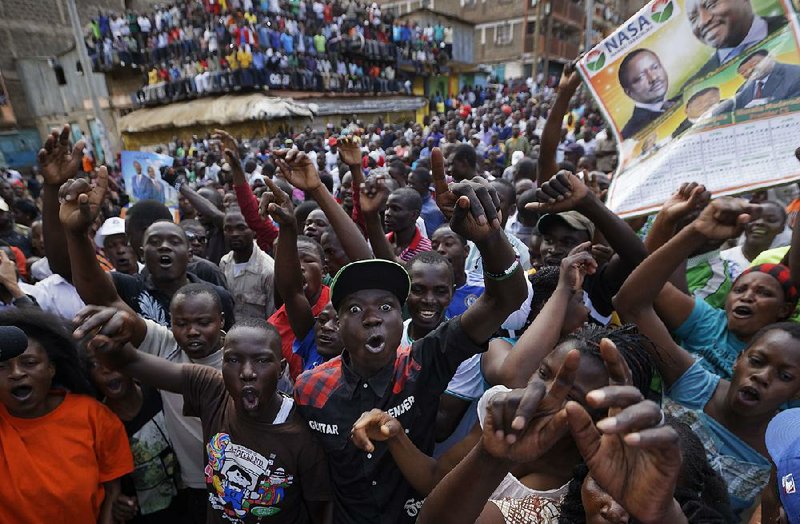NAIROBI, Kenya -- Kenyan opposition leader Raila Odinga on Sunday urged his supporters to skip work today to protest what he claimed were rigged elections that gave victory to President Uhuru Kenyatta. The government denounced violent demonstrations as unlawful and urged Kenyans to return to their jobs.
Odinga spoke Sunday to a cheering crowd in Nairobi's Kibera slum, an opposition stronghold and a frequent scene of clashes between stone-throwing protesters and police firing live ammunition and tear gas since the Aug. 8 election in which Kenyatta was declared the winner. Odinga's defiance fueled continuing uncertainty in Kenya, an East African economic hub that has been shaken by election violence and court challenges in the past.
"There is no work until Tuesday, when we will announce the next step," said Odinga, who previously claimed that last week's vote was rigged and who has unsuccessfully run for president on three previous occasions. Kenya's election commission said its process was fair, and international observers praised its handling of the election.
Late Sunday, machete-wielding members of two rival ethnic groups -- Luos and Kikuyus -- confronted each other in Mathare, another Nairobi slum, witnesses said. An Associated Press journalist in the area said he saw a Luo who had a deep machete cut in his head after he was attacked by Kikuyus.
While most of Kenya has been calm since the election, the possibility of an outbreak of ethnic violence has been a concern because many Kenyans vote along ethnic lines. Kenyatta is a Kikuyu; Odinga is a Luo.
More than 1,000 people died in ethnic-fueled violence after Kenya's 2007 election. Odinga was the losing candidate in that vote, and he was later made prime minister in a power-sharing agreement designed to defuse tension.
The opposition leader's announcement about his "next step" left Kenyans wondering whether Odinga would press his case that there was vote-tampering and even escalate the situation by calling for protests. One of his deputies previously ruled out the option of going to court, recalling Odinga's unsuccessful legal challenge after he lost the 2013 election. Some analysts believe it is unlikely that he would acknowledge defeat at this stage.
Odinga's call for followers not to work today will test his ability to mobilize his support base; it could also lead to tension if some supporters try to stop other people from going about their daily business.
Opposition areas, including the slums of Kibera and Mathare and the city of Kisumu, were mostly quiet Sunday morning, with many people attending church services and police patrolling some streets. Late Sunday afternoon, protesters threw stones and police lobbed tear gas in Mathare, according to journalists at the scene.
Also Sunday, Odinga visited the mother of a 9-year-old girl who was killed by a stray bullet during clashes between police and protesters in Mathare on Saturday.
Police gunfire has killed at least 24 people since the election, according to the state-funded Kenya National Commission on Human Rights, which monitors government institutions. However, police denied the report on Sunday, saying officers have killed six "criminals" who were looting, rioting and attacking police officers in the previous two days.
There was "a plot to kill our supporters," Odinga said in his brief remarks to supporters. On Twitter, he said people should observe a day of mourning today for "fallen patriots."
However, presidential spokesman Manoah Esipisu said Sunday that the protests were violent and unlawful, and that any peaceful protests are a constitutional right and would be protected by police.
"But sadly, we have seen violent protests, in which property has been damaged, and lives have been endangered," Esipisu said. "The violent protests are unlawful, so let me be perfectly clear here: The police will not tolerate breaches of the peace; instead, they will protect the lives and property of Kenyans, and they will restore law and order."
Information for this article was contributed by Christopher Torchia, Tom Odula and Jerome Delay of The Associated Press.
A Section on 08/14/2017

